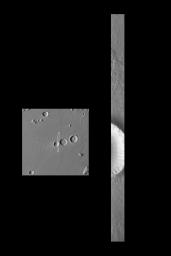This high resolution picture of a moderately small impact crater on Mars was taken by the Mars Global Surveyor Orbiter Camera (MOC) on October 17, 1997 at 4:11:07 PM PST, during MGS orbit 22. The image covers an area 2.9 by 48.4 kilometers (1.8 by 30 miles) at 9.6 m (31.5 feet) per picture element, and is centered at 21.3 degrees N, 179.8 degrees W, near Orcus Patera. The MOC image is a factor of 15X better than pervious Viking views of this particular crater (left, Viking image 545A49).
The unnamed crater is one of three closely adjacent impact features that display the ejecta pattern characteristic of one type of "flow-ejecta" crater. Such patterns are considered evidence of fluidized movement of the materials ejected during the cratering event, and are believed to indicate the presence of subsurface ice or liquid water.
Long, linear features of different brightness values can be seen on the steep slopes inside and outside the crater rim. This type of feature, first identified in Viking Orbiter images acquired over 20 years ago, are more clearly seen in this new [sic] view (about 3 times better than the best previous observations). Their most likely explanation is that small land or dirt slides, initiated by seismic or wind action, have flowed down the steep slopes. Initially dark because of the nature of the surface disturbance, these features get lighter with time as the ubiquitous fine, bright dust settles onto them from the martian atmosphere. Based on estimates of the dust fall-out rate, many of these features are probably only a few tens to hundreds of years old. Thus, they are evidence of a process that is active on Mars today.
Malin Space Science Systems (MSSS) and the California Institute of Technology built the MOC using spare hardware from the Mars Observer mission. MSSS operates the camera from its facilities in San Diego, CA. The Jet Propulsion Laboratory's Mars Surveyor Operations Project operates the Mars Global Surveyor spacecraft with its industrial partner, Lockheed Martin Astronautics, from facilities in Pasadena, CA and Denver, CO.

 Planetary Data System
Planetary Data System












